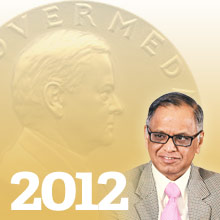N. R. Narayana Murthy

N. R. Narayana Murthy, 2012 Hoover Medal Recipient
N. R. Narayana Murthy was born in India (Mysore city, Karnataka State), on August 20, 1946. After completing his Bachelors in Electrical Engineering from the National Institute of Engineering, Mysore (1967), he completed his Masters from the Indian Institute of Technology, Kanpur (1969).
In the early seventies, during his stay in France, Mr. Murthy realized that the only solution to eradicate the problem of poverty in societies is through the creation of jobs with good disposable incomes and that such a solution requires entrepreneurs who could convert ideas into jobs and wealth.
Mr. Murthy changed from being a confused liberal into a determined compassionate capitalist following an event in 1974 when he was forced to spend a lonely, hungry, cold and introspective time in the guard’s compartment on a freight train from Nis (former Yugoslavia, which is now called Serbia) to Istanbul.
On his return to India, Mr. Murthy started an entrepreneurial experiment ‘Infosys’, to demonstrate that there are virtues in capitalism; that it is possible to create wealth legally and ethically in India; that one can follow the finest principles of corporate governance; that the democratization of wealth spurs high-growth, sustainable companies; that value-based business leadership creates goodwill for businesses; and that capitalism can be compassionate.
Building on these values, he founded Infosys Limited with six others in 1981 with a capital of US $250. In the beginning, Mr. Murthy realized that the true index of success of a corporation is its longevity which originates from the enthusiasm of its stakeholders. He realized that the best way to instill enthusiasm among stakeholders is by seeking their respect. Thanks to this vision, Infosys has grown in revenues from $40,000 in 1982 to $6.99 billion in 2012, with an employee base of 150,000. Infosys has often been voted as the most-respected corporation, the best-employer, the best-in-corporate governance and the best-managed company in India and Asia.
Infosys’ story under Mr. Murthy’s leadership has been the story of innovation. He conceptualized, articulated and implemented the Global Delivery Model (GDM) which has now become the backbone of the Indian software industry. Infosys has innovated not just in software services but also in finance, quality, productivity, human resources and infrastructure. Under his leadership, the company created the world’s largest corporate training facility in Mysore, which can train about 22,000 engineers in a year.
Mr. Murthy believes in the adage “The power of money is the power to give it away.” He feels that the need for social responsibility has become more essential in these days of skepticism about capitalism. The solution is to move towards compassionate capitalism which is capitalism with fairness, transparency and accountability, practiced by leaders towards their stakeholders such as customers, employees, vendor-partners, the government of the land and society.
He created the country’s largest (one of the world’s largest) stock option plan for the employees of Infosys by giving away as much as 35% of the total equity amounting to about $10 billion.
Mr. Murthy established the Infosys Foundation (IF) in 1996 to address the basic needs of the poorest of the poor. The IF has built libraries for underprivileged children in 15,000 villages across India, provided scholarships to thousands of children, built hospitals, rehabilitated sex workers, and the destitute, and supported cultural activities. IF and Mr. Murthy’s family, have extended support to Akshaya Patra, the largest free-lunch program in the world (1.3 million children are fed every day in India). In the United States, IF has supported science education for inner-city children.
Mr. Murthy, along with Infosys and his senior management colleagues established the Infosys Science Foundation (ISF) to recognize scientific research in the country. ISF awards six annual prizes of $100,000 each, to distinguished researchers in engineering and computer sciences, humanities, life sciences, mathematical sciences, physical sciences and social sciences.
Mr. Murthy’s family has supported several higher educational institutions in India and the United States including the Indian Institute of Technology – Kanpur, Indian Institute of Science – Bangalore, The National Law School – Bangalore, University of Mysore, Karnataka University, Harvard University, Stanford University, Wharton Business School, Cornell University, Claremont McKenna College and the San Francisco Science Center.
Mr. Murthy has received several civic and humanitarian awards. He was awarded the Padma Vibhushan in 2008, the second highest civilian award in India. The Woodrow Wilson Award for Corporate Citizenship awarded to Mr. Murthy in 2008 by the Woodrow Wilson Center, praised him for his quiet philanthropy. The Institute of Electrical and Electronics Engineers (IEEE) inducted Mr. Murthy as an honorary member in 2010 for supporting the empowerment of the disadvantaged rural communities and for having started the Infosys Science Foundation in 2009. Also, in 2001, he was awarded the Max Schmidheiny Freedom Prize by its Foundation at the University of St. Gallen Switzerland for being an advocate of social justice and progress. The Tech Museum, San Jose,California, has chosen Mr. Murthy for the James C. Morgan Global Humanitarian Award 2012, which honors individuals whose broad vision and leadership are helping to address humanity’s greatest challenges. Among others, Mr. Murthy also serves on the boards of the Ford Foundation and the UN Foundation.